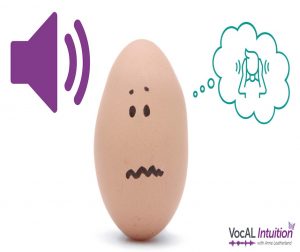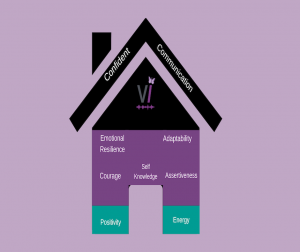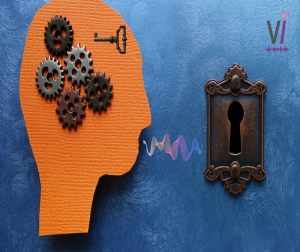Self?
I’ve been a vocal trainer for over 23 years now, working with all kinds of voice users; singers, actors, teachers, business owners and presenters. My experience has confirmed what I have somehow always known: Your voice alone, regardless of its energy, tone, beauty is incomplete without a connection to the person you are, your “self”. It is this final ingredient that really makes the difference in communication. We include this naturally in every day interactions, but it can become “lost” when we find ourselves in different situations.
So, here are some thoughts on why and how this is important. I am not a neuroscientist or a psychologist, but I do have my knowledge, experience and an intuition about how to connect as a teacher and a performer.
How I See Self and Voice

The easiest way to explain this is with a picture, hence the one above. Your voice has an important physical energy. This energy can be controlled by skilled use of the body and your vocal folds. Have you ever heard a speaker or singer however, who has this side of things worked out but who cannot fully include their thoughts, emotions, actions and beliefs? i.e. the self. Usually this means that their voice will not fully communicate, convey personality or sound authentic. This is because it needs energy from the self as well as that physical energy. It takes intent and awareness.
Why do we hold back?
Voice users tend to focus on the physical side; “I don’t like my voice’, “I need to work on my breathing” or “it’s all about pitch and pace”. Yes, these things are important and I tackle them all in my training, along with lots more. An over-concentration on them can however result in a mechanical approach, where the message doesn’t come through, due to too much “doing”. There can also be a fear of “getting it wrong” and possibly performance anxiety (stage fright).
We can admittedly feel vulnerable about showing too much of our self in our voice, especially in front of new colleagues or an audience. This can also be a trigger for performance anxiety (stage fright), and for some people perhaps a bigger one than that mentioned above. It really depends on the individual.
So what makes us tick?
Without getting too deeply into this, your brain makes you tick. This complex organ controls your everyday unconscious processes and conscious thoughts and actions. Our view of who we are, our self, is affected by many things, including our life experiences (subconscious) our values and beliefs and crucially, what we tell ourselves.
In the case of performance anxiety, the issue is caused by an unconscious response to a real or imaginary “threat”. The brain doesn’t know the difference. However, recognising your own thoughts and emotions, and believing in your self can help. This allows you to give the brain a new message. “There is no danger”, “I am ok”.
Once this is done, your real self has permission to come out and it can show in your voice.
Energy Balance
Overall then it is about a balance of energies from your body and your self, governed by your mind. Some of you may be thinking “it is just about relaxing”; well, I know what you mean. Relaxing everything though won’t create an energised speaking or singing performance. Neither will completely relaxing the self, to a state of torpor. Rather, you need appropriate engagement and mindfulness in what you are doing, and the trust to show your true self.
I hope you’ve found this interesting, I’d love to hear your comments and ideas. The next obvious question is “how can I find this balance?” Keep a look out for part II of this blog where I’ll be giving you some ideas.
You can also follow me on LinkedIn: https://www.linkedin.com/in/anneleatherland or on Facebook: https://www.facebook.com/Vocalintuition




